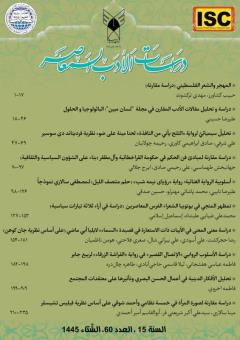Analysis of the narrative technique of "short connection" in the novel "Al Farashe Zarqa" by Rabi Jaber
Subject Areas : Contemporary Literature Studies
Fatemeh Abbasi Hafeshjani
1
![]() ,
Leila Ghasemi Hajiabadi
2
*
,
Leila Ghasemi Hajiabadi
2
*
![]() ,
tahere chaldare
3
,
tahere chaldare
3
1 - PhD student, Department of Arabic Language andLiterature, Garmsar Branch, Islamic Azad University, Garmsar, Iran
2 - Assistant Professor, Department of Arabic Language and LiteratureGarmsar Branch, Islamic Azad University, Garmsar, Iran
3 - Assistant Professor of Arabic Language and Literature, Faculty of Humanities, Islamic Azad University of Garmsar
Keywords: postmodern novel, para-narrative, short circuit, Rabi Jaber, Al Farashe Zarqa,
Abstract :
Para-narrative is one of the most obvious styles of post-modern story writing. As its title suggests, it has been used to transition from a normal narrative to an innovative and unconventional one. In this postmodern method, which was proposed by writers from the last decades of the 20th century to breathe a new spirit into the novel, various and numerous contemporary components are used, the most important and prominent of which is "short connection", which means creating a triangular and triangular connection between the author. The audience is the author of the story and the author of the character. This article discusses the wide use of postmodern techniques in Rabi Jaber's fictional works and analyzes this technique in the author's novel "Al Farasha Zarqa" to show how contemporary Arab novelists, according to the stylistic requirements and literary currents of the world, use this method technically and Industrialists are employed. The result shows that Rabi Jaber has used this method in the mentioned novel for innovation, dynamism and creation of a new and new narrative, as well as introducing important and modern themes and breaking the old taboos of the classic novel and blurring the border between fantasy and reality. It should be noted that the method used in this research is descriptive-analytical.

